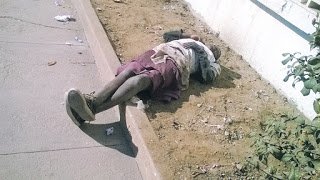
Moses Ziyambi
MASVINGO – Authorities in Masvingo, and indeed the rest of the country, are turning a blind eye on the spike of mentally challenged people on the streets although the situation has reached crisis level that requires urgent intervention.
In Masvingo, there has been a shocking increase in the number of people with mental health challenges, making it difficult to cross any street at any given time of the day without meeting a person or two with mental disabilities.
Despite the glaring gravity of the situation, authorities seem indifferent although homeless mentally-challenged people are among the most vulnerable people with females being even less safe as they are exposed to perverted sexual abuse.
In their daily forage for food in the dust bins, these people leave a trail of litter as they remove the rubbish from the bins thereby undoing the city’s efforts to maintain cleaner streets.
With the worsening economy, the problem is getting out of hand as street children and vagrants continue to settle on the pavements.
Earlier this year, government released data showing that there are 91 390 mentally ill patients in Zimbabwe.
Health minister Dr David Parirenyatwa attributed the problem to economic distress and lack of counselling services to most people who need them.
Traditional belief systems are still intact though, and many people are convinced that mental abnormalities are a result of witchcraft; usually bad spells cast upon somebody by jealousy relatives.
When asked what was being done to rehabilitate the mentally ill people on the streets, City of Masvingo, through the housing department, said they were aware of the problem but could not do anything due to bureaucracy.
The city cited the Health Act which purportedly authorises only the police to round up the people and a magistrate to authorise their rehabilitation.
“We are not allowed to just pick them from the streets. Our duty is simply to make government aware that such people exist and leave it there. It is the government’s duty to see what to do with those persons,” council said in a statement.
Masvingo District Administrator (DA) Makepeace Muzenda said the situation was worrying and promised to take up the matter with her superiors.
“There are some religious organisations that are showing a commitment to help those people but we need more intervention. I am going to take up the matter with higher office so that we can find out how we can solve the problem,” said Muzenda.
There are only two institutions that take care of people with mental health challenges; the government-run Ngomahuru and Zimcare Trust’s Ratidzo School.
Ngomahuru, situated around 50km to the south of the city, has lately been described as a forgotten human dumpsite owing to the deplorable conditions there.
While conditions at Ratidzo School are more humane, the institution caters only for children, and is by no means, in a position to absorb all people with mental disorders.
In a society where government services and capacity have virtually collapsed at all levels, public expectation and hope has naturally shifted towards civic society and Christian organisations for leadership.
Despite the proliferation of private voluntary organisations and churches and their active leadership in other areas of deficit such as welfare for orphaned school children, they seem to be shying away from embracing the challenge of dealing with the mentally-handicapped, probably for the obvious emotional and economic costs involved.
Outrageous government bureaucracy, inherent in all facets of official conduct, can also frustrate and cripple even the most well-meant of intentions.
“The blame lies squarely on government’s doorstep. They created the economic problems that are traumatising people to insanity and are ignoring the victims. As Christians, we are depressed by the situation of these vulnerable people and we are praying for them but we are also affected by the same economic rot,” said a local cleric, Rev Tapfumaneyi Zenda.news
—
He who said it can not be done must not disturb the one doing it!
